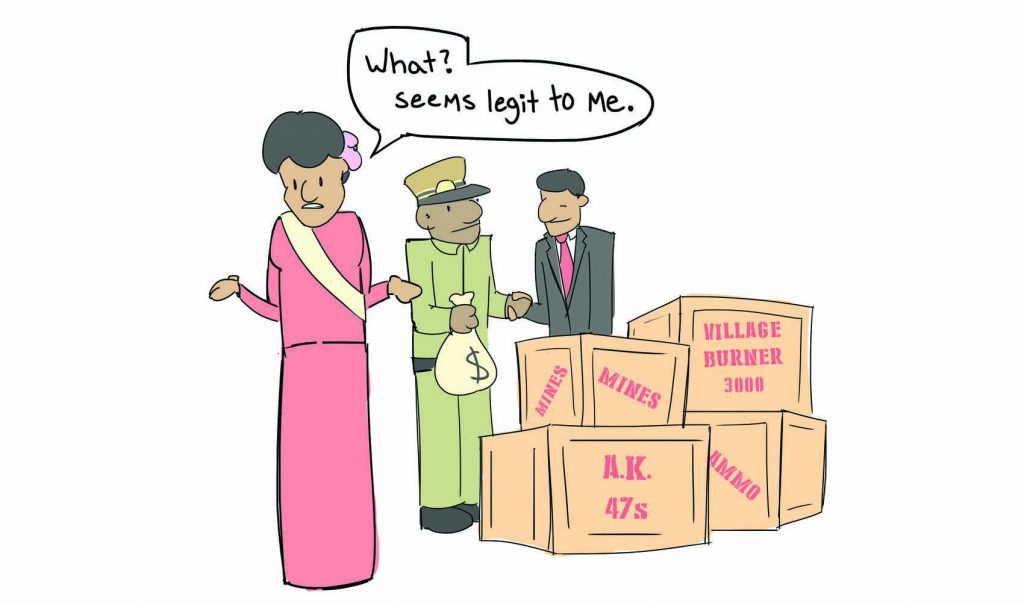When the Independent International Fact-Finding Mission on Myanmar released its most recent report on August 5, it presented the government with an opportunity.
The report was an investigation of the Tatmadaw’s vast economic interests, including its foreign partnerships and ties to the lucrative jade industry.
Much of the media coverage focused on the report’s recommendation of targeted sanctions against the military’s companies, particularly Myanmar Economic Holdings Limited and Myanmar Economic Corporation.
Predictably, this was criticised by many inside Myanmar as foreign meddling in the country’s internal affairs.
But the report’s focus was less about punishment or accountability for actions in Rakhine State and other parts of the country than guiding responsible investment and finding the right levers to encourage – or force – the Tatmadaw to transform into an institution that respects democracy, civilian governance and human rights.
It made the case that the Tatmadaw’s ability to generate revenue outside the parliament-approved budget undermined civilian oversight of the military, including the ability of civilian actors to prevent military abuses across the country. Further, the report found that the military’s economic activities, particularly jade mining, actually fuelled conflict in northern Myanmar.
The report did not absolve the civilian government of responsibility, particularly in regards to the activities of the Union Enterprise for Humanitarian Assistance, Resettlement and Development in Rakhine (UEHRD) in northern Rakhine State. These activities include destroying evidence of possible human rights violations and undermining the sustainable return of the Rohingya population.
But the report’s narrow focus still gave the government the opportunity to put some distance between its policies and the actions of the Tatmadaw.
The government could have said that it supported civilian oversight of the military and believed that in a democratic political system a national military should not operate its own businesses or have independent sources of income.
Instead, it blew it.
A day after the report’s release, the Ministry of Foreign Affairs said in a statement that the government “categorically” rejected the report and its conclusions.
“We regard the report as an action intended to harm the interests of Myanmar and its people, and we do not believe that such an action contributes in any way to the resolution of the challenges that the nation faces in Rakhine State,” it said.
Once again, the civilian government shouted to the world that it’s in lockstep with the Tatmadaw – not just in Rakhine, but all over the country.
Despite what the response from the Myanmar government might suggest, the recommendations in the fact-finding mission report are quite moderate. Yes, there is a call for targeted sanctions, but there is no suggestion of a return to the sanctions regime of the 2000s, when the US and other Western countries banned investment – and in the case of the US, even bilateral trade – in an attempt to weaken the junta.
But the fact-finding mission goes beyond recommending economic isolation of the Tatmadaw. In parallel, it actually encourages “the promotion of economic ties and engagement with non-Tatmadaw companies and businesses in Myanmar as a means of building and strengthening the non-Tatmadaw sector of the economy”. Any sanctions should also be implemented “in a manner that respects human rights and gives due consideration to any negative socio-economic impact”.
The fact-finding mission argues that eroding the economic base of the Tatmadaw will have a number of positive effects, such as undercutting its ability to obstruct the reform process, impairing its ability to carry out its operations, encouraging continued economic liberalisation and serving as an immediate form of accountability or punishment.
Taken out of the context of Rakhine State, the recommendations would probably find strong support among the National League for Democracy membership, not to mention other political and civil society organisations that have traditionally opposed the Tatmadaw and sought stronger or outright civilian rule.
The NLD even made civilian oversight part of its 2015 election manifesto, promising to “work towards the Tatmadaw and institutions of national defence coming under the aegis of the executive branch”.
Much has changed since then. Whether the NLD leadership can look beyond Rakhine State to see the bigger picture remains to be seen.







